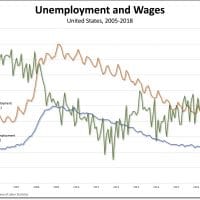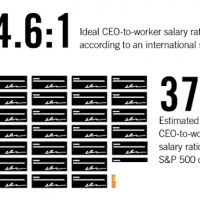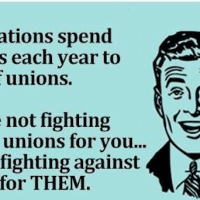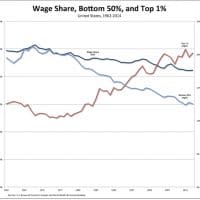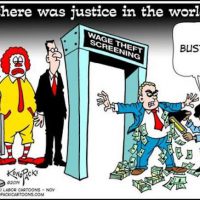-
Their beautiful recovery
Does anyone really need any additional evidence of the lopsided nature of the current recovery?
-
Inequality and fairness
In a 2014 study, Sorapop Kiatpongsan and Michael Norton asked about 55,000 people around the globe, including 1,581 participants in the United States, how much money they thought corporate CEOs made compared with unskilled factory workers.
-
May Day 2018: Exploitation, NO! Expropriation, NO! Unite for justice!
In view of the historic May Day, May 1st, analysts from Monthly Review, the famous independent socialist magazine, identify tasks the working classes should press with. The following interviews were conducted in early April with John Bellamy Foster, Professor and Editor of Monthly Review; Fred Magdoff, Professor Emeritus, and one of Monthly Review’s closest associates; […]
-
Marx and the cinema
Dennis Broe traces the history of the representation of labour on screen, and finds inspiration for celebrating May Day and continuing Marx’s struggle against capitalism.
-
Anti-materialism, capitalism, and violence against the human body: some preliminary comments
There are two kinds of on-going ‘attack’ on the materiality of the body (and nature) in capitalist society. A discursive attack inspired by post-structuralism; and an actual, objectively-existing, material attack by capital and its state. The latter is the focus of this article.
-
Chávez The Radical XIV: “we can’t convert everything we produce into merchandise”
In Chávez The Radical XIV, Chávez reflects on the contradictions of public planning and the transition to a socialist economy, within a system that remains dominated by capitalism.
-
Purple bullying, ten years later: SEIU trustees trample membership rights
At the Labor Notes conference in Chicago this coming weekend, 2,500 rank-and-file activists will attend the largest gathering ever hosted by the now Brooklyn-based labor education project. This will be the nineteenth Labor Notes conference, which started in 1981.
-
Precarious work and contemporary capitalism
Unions have no choice but to put major resources into confronting the reality of precarious work and organising around whatever can be won in the workplace. Otherwise they will simply wither.
-
Imperialism today: a critical assessment of Latin American dependency theory
The main theorist of dependency anticipated trends of neoliberal globalization. He analyzed productive globalization, the centrality of exploitation and the relative weight of surplus value transfers. But the employment crisis exceeds what was envisaged by Marini, in a scenario disrupted by the mutation of the United States, the collapse of the USSR and the rise of China.
-
U.S. workers and their decades of lost earnings
It happened gradually, but thanks to the U.S. media, economic news has largely been reduced to stock market reporting. Want to know how the economy is doing? Check the S&P 500 Index. Want to know whether the latest Trump proposal is good or bad? Check the S&P 500 Index.
-
The robot, unemployment, and immigrants
For every industrial robot introduced into the workforce, six jobs are eliminated. – Since a few days, Amazon has started Amazon Go. The idea is simple: a shop where you go in, take whatever you want from the shelves, and the cost goes automatically to a magnetic card that you carry.
-
Janus and fair share fees
Over the last decade, a number of cases attacking the rights of public-sector union members have been quietly working their way through the courts and, finally, up to the U.S. Supreme Court.
-
Mapping social reproduction theory
Let us slightly modify the question “who teaches the teacher?” and ask this of Marxism: If workers’ labor produces all the wealth in society, who then produces the worker? Put another way: What kinds of processes enable the worker to arrive at the doors of her place of work every day so that she can produce the wealth of society?
-
Driverless trucks are wiping out jobs
Driverless trucks are on the way sooner than most workers realize, as corporations seek to raise profits by cutting labour costs. Media reports indicate that investors and researchers agree that tech change in the trucking industry will soon replace 1.7 million jobs in the U.S., where trucking was the most common job in 28 states in 2014. Some predict that pay rates for the remaining human drivers will fall rapidly from the current average annual of $42,500. The jobs of another 1.7 million taxi, bus and delivery vehicle drivers are also at stake.
-
Utopia and the right to be lazy
Students are much too busy to think these days. So, when a junior comes to talk with me about the possibility of my directing their senior thesis, I ask them about their topic—and then their schedule. I explain to them that, if they really want to do a good project, they’re going to have to quit half the things they’re involved in.
-
Dutiful dirges of Davos
Thousands of people will gather next week in Davos. Their combined wealth will reach several hundred billion dollars, perhaps even close to a trillion. Never in world history will be the amount of wealth per square foot so high. And this year, for the sixth or seventh consecutive time, what would be one of the principal topics addressed by these captains of industry, billionaires, employers of thousands of people across the four corners of the globe: inequality…
-
What’s the matter with America?
Last week, Thomas Frank welcomed Paul Krugman to the ranks of those who believe that the American working-class in recent decades has often voted against its fundamental economic interests by supporting conservative Republicans.
-
Two billion dollars in stolen wages were recovered for workers in 2015 and 2016—and that’s just a drop in the bucket
The last four decades have been marked by rising wage inequality, with the vast majority of American workers experiencing wage stagnation while those at the top rung of the economic ladder reap the benefits of growth in productivity. These dynamics mean that many workers struggle to make ends meet; in 2016 one in five families in which at least one person worked were living below 200 percent of the federal poverty line (U.S. Census Bureau 2017).
-
Capitalism’s life source: the domestic and social basis for exploitation
Social reproduction theory (SRT) sounds quite intimidating, but the (rather grandiose) anthology of big words masks a relatively simple question: if capitalist production is fundamentally the production of commodities, and it is workers who produce such commodities, who ‘produces’ the worker?
-
Employers would pocket $5.8 billion of workers’ tips under Trump administration’s proposed ‘tip stealing’ rule
On December 5, the Trump administration took its first major step toward allowing employers to legally pocket the tips earned by the workers they employ. The Department of Labor (DOL) released a proposed rule that would allow restaurants to take the tips that servers earn and share them with untipped employees such as cooks and dishwashers.

